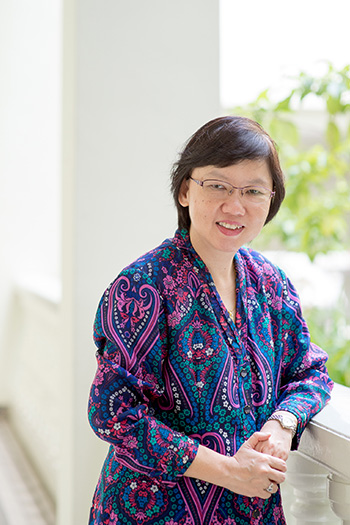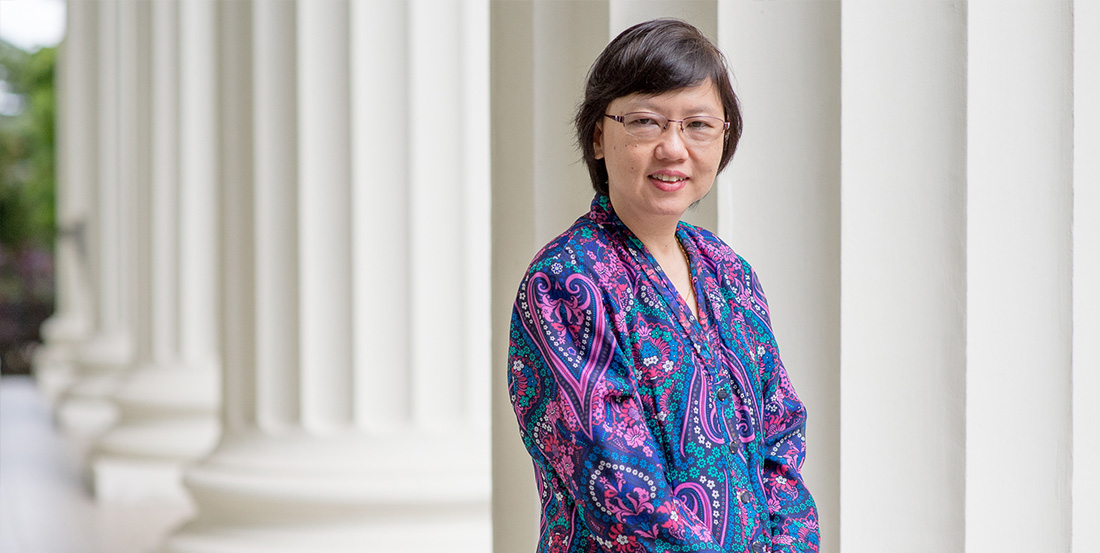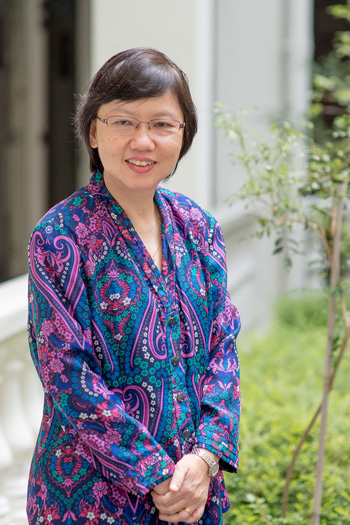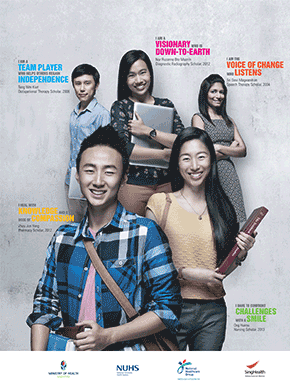Today, Singaporeans enjoy one of the highest life expectancies in the world. However, the growing numbers of elderly who require extended care will stretch the resources of our public healthcare system. We speak to the Permanent Secretary for Health, Mrs Tan Ching Yee, to find out how the Ministry of Health (MOH) aims to help our healthcare system evolve alongside these challenges.
S
ingapore’s public healthcare sector is a fast-growing industry that is racing to stay ahead of and anticipate the demands of a greying population. The opportunities in this sector are boundless, and there is a growing demand for nurses and Allied Health professionals such as diagnostic radiographers, occupational therapists and speech therapists to provide holistic care.
To this end, the Healthcare Scholarships aim to develop a strong Singaporean core of bright and passionate healthcare professionals with the heart and desire to make a difference in the health and lives of their countrymen. Tan Ching Yee, Singapore’s Permanent Secretary for Health, tells us about the plans that MOH and the various healthcare clusters have for the future and the exciting growth opportunities that aspiring Healthcare Scholars can look forward to.
What are some of your responsibilities as Permanent Secretary (Health)?
Tan Ching Yee: I am involved in the planning of strategies to ensure that the national healthcare system meets the needs of Singaporeans. I also look into policies to make sure that the public healthcare system continues to deliver affordable, accessible and high-quality care, so that Singaporeans can live well, live long and with a peace of mind. The work is wide-ranging, from reviewing subsidies in outpatient clinics to planning for new aged care facilities in every neighbourhood.
In addition, I work closely with our key partners such as the Health Promotion Board to implement public education campaigns that promote healthy living and preventive care. After all, prevention is better than cure and a robust healthcare system informs and provides the public with the resources they need to maintain their good health.

"Overall, public healthcare is a very exciting and dynamic industry, where healthcare professionals are required to constantly keep up with an expanding body of knowledge and skills and broaden their minds."
Share with us some key highlights from your time at MOH.
Ching Yee: During my two plus years here, I was glad to be able to support the Minister for Health in reviewing key healthcare financing policies, which resulted in three major shifts on the policy front. These included enhanced subsidies to help lower- and middle-income patients in outpatient settings and an extension of Medisave usage to include additional scans and diagnostic tests beyond MRI and CT scans for cancer patients. Furthermore, we will be introducing MediShield Life – a universal health insurance programme for all Singaporeans and Permanent Residents (PRs) – at the end of 2015. Under MediShield Life, all Singaporeans and PRs will receive coverage even if they have pre-existing conditions or were previously rejected by insurers. This is really a big step forward in providing accessible and affordable care for all!
I also enjoyed the many opportunities to interact with healthcare leaders and the different groups of healthcare professionals such as nurses, Allied Health professionals, doctors, dentists and administrators who work together as a dedicated team to deliver the best care for patients.
In your opinion, what are the main challenges facing Singapore’s healthcare system today and how is MOH looking to address these challenges?
Ching Yee: An ageing population results in quite the conundrum, as the decreasing old-age support ratio as a result of the shrinking workforce will mean fewer available resources at a time when we need it the most. It is thus imperative that we find ways to meet these growing demands. However, it’s important to bear in mind that high healthcare expenditures do not always guarantee better health outcomes, which is why we must invest strategically in areas that will not only deliver good healthcare outcomes, but also remain at a sustainable level of affordability for both current and future generations.
MOH is already working on meeting these challenges head-on. As outlined in the Healthcare 2020 plan, we are in the process of building a more comprehensive aged care system and developing new models of care. In addition to infrastructural development, this includes more effective management of chronic diseases and the development of more robust intermediate and long-term care and support frameworks through the provision of community hospitals, daycare centres, homecare services and nursing homes to complement the acute care hospitals. We are also looking to bolster preventive care and renew our focus on primary care providers as the first line of healthcare within the community.
What sets the public healthcare sector apart from other industries?
Ching Yee: Singapore’s public healthcare sector is a fast-growing one. Government spending on healthcare has been projected to grow to S$12 billion by 2020, up from S$4 billion in 2011. The construction of new hospitals and care facilities will create many new career opportunities for those who wish to grow professionally and contribute to the sector in a variety of ways. It also provides good career opportunities which are not as susceptible to the unpredictability of business cycles.
Tan Ching Yee
Designation:
Permanent Secretary, Ministry of Health
Studied:
Master of Science in Management,
Stanford University, US
Bachelor of Arts in Economics,
University of Cambridge, UK
Healthcare professionals have plenty of opportunities to take on meaningful responsibilities. Given the variety of professions available in healthcare, individuals will be able to pursue their own niche interests and make a positive difference in people’s lives! In addition, they will embark on a journey of continuing education, where many eventually go on to acquire advanced training or qualifications to further specialise or take on more complex work.
"Prevention is better than cure and a robust healthcare system informs and provides the public with the resources they need to maintain their good health."
Overall, public healthcare is a very exciting and dynamic industry, where healthcare professionals are required to constantly keep up with an expanding body of knowledge and skills and broaden their minds.
What is MOH Holdings (MOHH) doing to attract more Healthcare Scholars? What can Healthcare Scholarship hopefuls look forward to?
Ching Yee: MOHH works closely with schools to give career talks and inform students about various career options in public healthcare. By helping students learn more about the healthcare sector through healthcare discovery tours, job-shadowing or attachment programmes, it provides them with the experience and relevant resources to make an informed choice.
At the start of their scholarship journey, Healthcare Scholars will undergo a structured Healthcare Induction programme, where they will participate in camps, service learning programmes and various policy-sharing cum dialogue sessions. Some scholars also take up short internships with MOH, MOHH or one of the healthcare institutions prior to their course commencement.
During their studies, scholars have opportunities to participate in various developmental programmes such as professional seminars, student exchange programmes and community involvement programmes. They can also look forward to meeting members of the senior management and engaging healthcare leaders and professionals from different healthcare institutions. In fact, I try to meet up with our overseas scholars when I travel abroad for work trips! For example, I recently met up with a group of respiratory therapy scholars in Boston in the US, after speaking at the 2014 Singapore Seminar organised by the Public Service Commission (PSC). For scholars who opt to pursue professional Allied Health courses at overseas universities, they can still keep abreast of the latest developments in the local healthcare landscape through mid-course vacation attachments at our hospitals.
And when they join the healthcare sector, scholars will be part of a multi-disciplinary team of experts who work together to deliver the best in patient care. They can also look forward to varied career experiences, where they can progress along different career tracks in a clinical setting, or in leadership, education or research roles. Scholars can also take on special projects or a policy stint with MOH as part of their career development!
"Scholarship hopefuls will need to possess agile minds to master and keep up with a substantial body of knowledge. They must have the passion to help others and be able to empathise keenly with their patients and family members, who all have very real emotional needs and fears."
What advice do you have for aspiring Healthcare Scholars?
Ching Yee: Aspiring Healthcare Scholars should have the head, heart and hands for healthcare. Many healthcare courses are demanding, requiring a solid mastery of literacy, numeracy and science. Scholarship hopefuls will need to possess agile minds to master and keep up with a substantial body of knowledge. They must have the passion to help others and be able to empathise keenly with their patients and family members, who all have very real emotional needs and fears. To be effective, they need to apply their skills to improve patients’ health and lives.
Above all, they should do all they can to gather information about a healthcare career and take up any available internship opportunities available. Many students apply because of positive internship experiences – if the job speaks to you and appeals to your sense of compassion, go ahead and apply for the scholarship!



